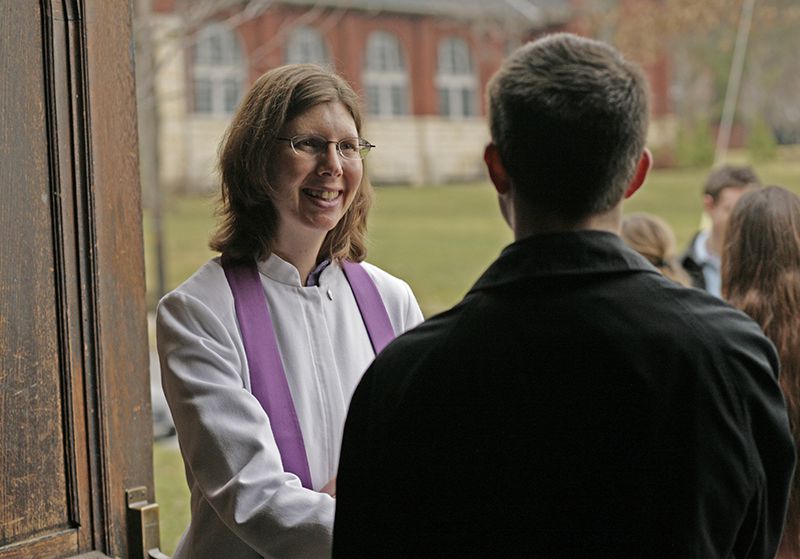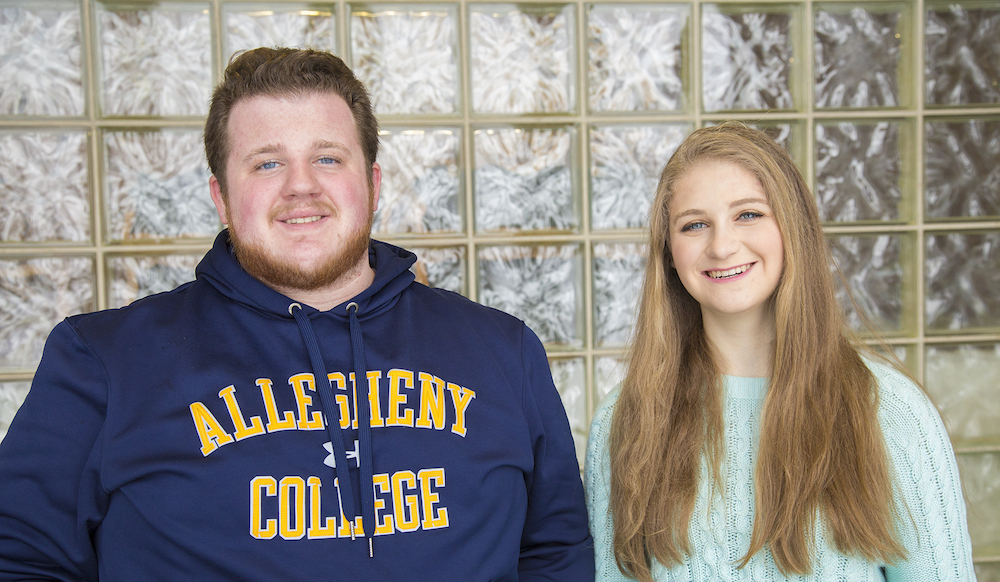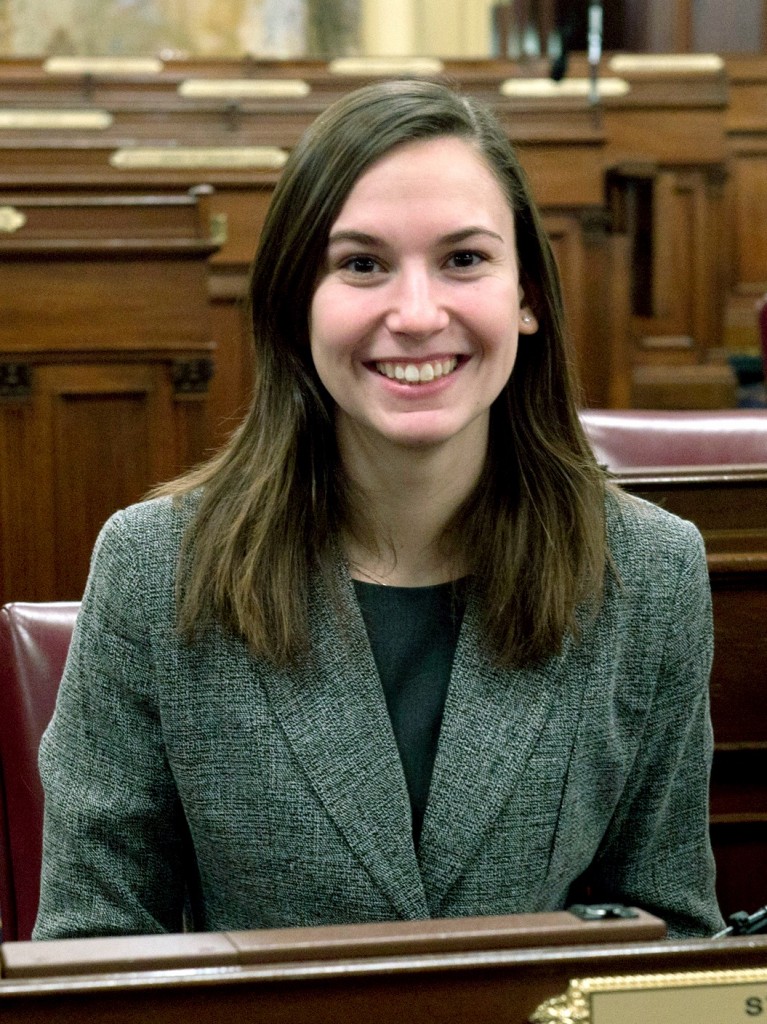
A desk seldom separates the Rev. Jane Ellen Nickell from visitors in her office.
Rather than sequester herself behind furniture, the Allegheny College chaplain much prefers to sit adjacent to her guests, the room encased with bookshelves and filled with gentle, dim light.
Nickell’s office is as warm and inviting as her presence is on Allegheny’s campus. The ordained United Methodist minister oversees the Office of Spiritual and Religious Life, leads Sunday worship services, advises student groups and teaches religious studies courses.
Nickell accepted her position at Allegheny 11 years ago. Her history is widespread geographically – she grew up in West Virginia, moved from Pennsylvania to Illinois and to Tennessee, back to West Virginia, then to New Jersey before settling in Meadville. She has also traveled so far as to Israel, Mexico and Romania.
Graduating first as an English major from West Virginia Wesleyan College, she began a career at the University of Illinois’ Krannert Center for the Performing Arts. She took courses in the university’s musicology program while working but still retained her Methodist roots. Eventually she decided to transition into the ministry, but didn’t see it as a drastic change. She said both vocations were about “bringing people into experiences that touch their spirits and their souls.”
After completing seminary at Vanderbilt Divinity School in 2000 and working at a church for three years, she attended Drew University in 2003 to complete her doctorate in religion. She came in 2006 to Allegheny, which she appreciated for its fostering of interfaith work, and open discussions on challenging topics between people of all faith backgrounds.
During her years at Allegheny, Nickell has embraced the increase in diversity on campus—in race and ethnicity, gender identities, and religious preference. She says that it’s important to have a worship area, like the College’s Ford Memorial Chapel, that is welcoming to all members of the community.
The chapel has become one of her favorite places on campus. “Obviously that’s where I do a lot of my work,” she says, “I find it a really warm and inviting space. But I was also involved in the renovation of the building seven years ago, and doing that was able to learn a lot about the history.” She is equally fond of the Prayer and Meditation Retreat, the red house next to Arter Hall, where Hindu, Muslim and Buddhist students have created a welcoming space.
Nickell’s scholarly work also has focused on the significance of diversity. She has been published in various books and journals, such as “Worship Arts,” “Ecospirit” and “The Prophetic Voice and Making Peace.” Many of her writings focus on gender and sexuality as they pertain to religion. Her dissertation – “We Shall Not Be Moved: Methodists Debate Race, Gender, and Homosexuality” – is her attempt to “understand why people in the same church or same family read the Bible very differently.”
Nickell’s book by that title is now on this year’s United Methodist Women’s reading list, and she has also given various talks on the subject.
Nickell says she sees herself not as a frontrunner for pushing her beliefs, but as a mediator to find out “what’s at stake for people on both ends of the spectrum” in hopes of closing the gap. “What I can contribute to this is scholarship,” she adds.
The following are excerpts from a recent interview with Nickell:
What is something most people don’t know about Allegheny?
“One of the things is that we’re United Methodist affiliated. I hear people say ‘well loosely’ or ‘we used to be,’ but we are. We’re on the list of 120-or-so affiliated schools. And I don’t think that needs to be a scary thing. There’s a lot of common ground. I look at things like their Imagine No Malaria campaign, and work with the World Health Organization. And we have a global health department. We’re concerned about the same things. We’re concerned with social justice. And also, we bring faith into conversation with academics and intellectual life. John Wesley, the founder of Methodism, was an Oxford tutor. His faith was always very intellectual. Methodism brings reason and faith together; we are pressed to question things, rather than just taking things at face value. It’s an inquisitive faith.”
Who is your favorite musician?
“James Taylor. I should be saying something classical, having worked in the performing arts, but I love J.T.”
What instruments do you play?
“I play piano, I studied piano all through graduate school, and have done a lot of choirs, and choral singing. I was in the band too, but it’s been a long time.”
What do you do in your spare time?
“I spend time working in my yard, cooking, watching the Food Network; either learning about or doing food. I spend time with my cats – I have two cats who love to play, and snuggle lots. Just doing things with friends and with my family; I’m closer to my family, I’ve lived farther away so it’s nice to be close.
Where is your favorite place you’ve traveled to?
“The place that I really want to go back to is Israel. Eric (Pallant, professor of environmental science) led a faculty/staff trip about four years ago, and part of it was the group I went with, but it was also just such a fascinating place, layers and layers of religious history and tension, but just really wonderful. We spent several days in Jerusalem itself. We were in Capernaum, and it was ‘here’s Peter’s house, and here’s the synagogue where Jesus preached, and here’s the Sea of Galilee,’ and I just went, ‘oh my gosh – Jesus was here!’ And it kind of overwhelmed me.
“We also visited the Arava Institute, and that’s where we send a lot of students working on environmental issues. Arava intentionally brings Israeli, and Arab, Palestinians together to work on issues of water and energy. All the things that are pressing all of us but especially in a country with limited resources. We hear students from the institute say ‘in 20 years the wars are not going to be over religious issues; they’re going to be over water.’”
What is your most important advice for today’s college students?
“Take time. Take pauses. Students should find whatever helps them slow down, and reflect, and pause, and give themselves time to absorb. Technology has allowed us to process so much information, but I don’t think our brains, and definitely not our spirits, have caught up. Give yourself that time to just take it all in.”

